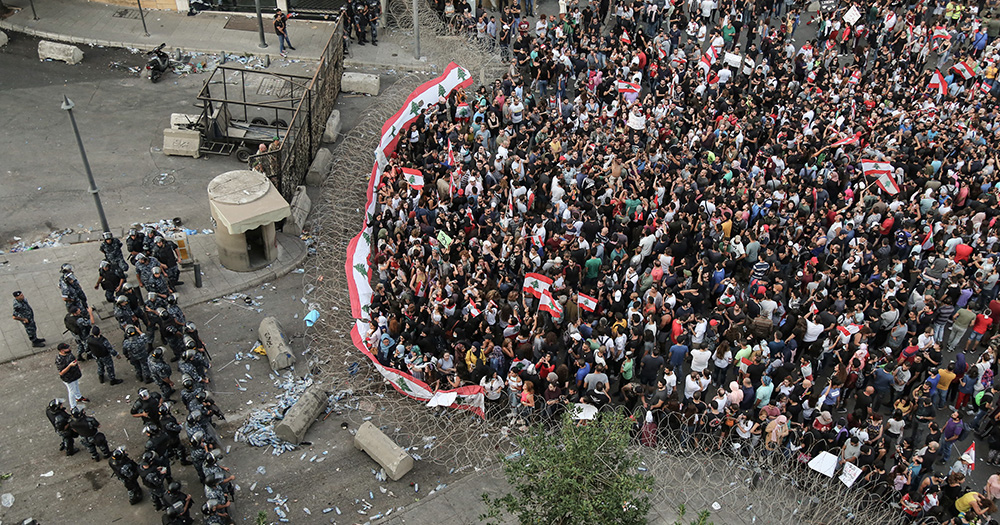A proposed daily tax of US$0.20 (S$0.27) for Voice over Internet Protocol (VoIP) calls in Lebanon has been reversed after it sparked massive protests calling for the resignation of the government, Aljazeera reported.
Lebanon has some of the highest telecom prices in the region
London-based Arshaq Al-Awsat reported that the tax would have applied to communication apps such as WhatsApp, Facebook Messenger and also FaceTime, which make use of VoIP.
Protest organiser Nizar Hassan said the country currently has some of the highest telecommunication prices in the region, which means many Lebanese use WhatsApp to communicate, Al-Monitor reported.
The protests began within the Lebanese capital of Beirut on Thursday, Oct. 17, the same day that the tax was announced.
It then spread to the rest of the country.
The government subsequently backtracked a few hours later, but the protests continued, and have currently entered their sixth day as of Oct. 23.
The protests have been largely peaceful, although around 70 people were arrested on Oct. 19 for vandalism and looting.
Reuters reported that tear gas was also fired at protesters on Oct. 17 and 18 by security forces, after a building was set on fire.
An economy in dire straits and with poor infrastructure
Al-Monitor further highlighted that the protests have since evolved into a larger movement against the perceived failures of the Lebanese government, especially with regards to the country's dire economic and infrastructure situation.
Lebanese media An-Nahar reported that the unemployment rate stands at 25 per cent, with the figure rising to 37 per cent for those under 25.
Aljazeera further stated that the country's public debt stands at US$86 billion (S$117 billion), or 150 per cent of the country's GDP.
Additionally, the country has also been plagued by crises of garbage, fuel and electricity, as well as a shortage of bread, Israeli media Haaretz reported.
The BBC also reported that many citizens are also angry with perceived inaction by the authorities in handling the country's worst wildfires in decades.
Notably, the country's firefighting helicopters could not be used because they were in need of maintenance.
Anger at sectarian political system
Many of the protesters have also voiced their anger at the country's sectarian political system, on the grounds that it has created patronage and clientelism.
Currently, political power in Lebanon is divided among the country's largest religious groups -- the prime minister must be a Sunni Muslim, the speaker of parliament must be a Shi'ite Muslim, while the president must be a Maronite Christian.
Additionally, parliament seats must be equally divided between Christians and Muslims.
As such, protesters have called for the resignation of the government, and the handing of power over to a transitional council of judges with no political affiliation, until elections are held, Aljazeera added.
Protesters reject prime minister's reform package
Lebanese protesters subsequently rejected a proposed reform package put forward by Prime Minister Saad Hariri on Oct. 22.
Aljazeera separately reported that the reforms included cutting the salaries of some current and former politicians by half, and abolishing several of the country's state institutions.
However, these were rejected by protesters on the grounds that it did not address their key concerns, and that they no longer trusted the government.
Key Christian party resigns from government
Thus far, the Lebanese government has been hit by the resignation of at least one entire party over the protests.
France24 reported that ministers belonging to the Christian Lebanese Forces party resigned on Oct. 19, with their leader, Samir Geagea, stating:
"We are now convinced that the government is unable to take the necessary steps to save the situation."
Other members of the government have since voiced their opposition against resignation.
The leader of Hezbollah, Hassan Nasrallah, whose organisation is also part of the government, stated that resigning would only make the situation worse.
Top photo by Marwan Naamani/picture alliance via Getty Images
If you like what you read, follow us on Facebook, Instagram, Twitter and Telegram to get the latest updates.
